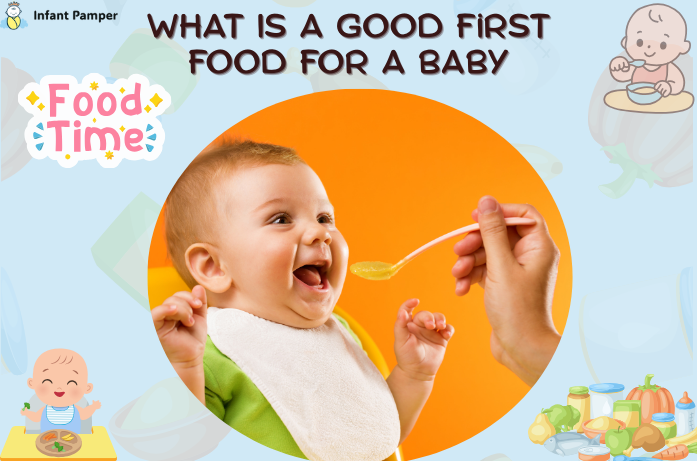By a caring mom at Infant Pamper
The first spoonful of food fed to your baby is more than a bite; it is a cherished memory to be remembered forever. But these are also the beginning of new skills, nutrition needs, and family routines. Here is a 10-part guide filled with parent-tested tips and expert-backed information to ease out the journey.
1. Know When Baby Is Ready
Most babies are ready for solids around 6 months and not before 4 months since the digestive systems and swallowing reflexes need to mature. as explained by CDC When, What, and How to Introduce Solid Foods. Signs of readiness include:
- Sitting up with minimal support
- Good control of head and neck
- Showing interest in foods, watching, reaching, or even grabbing it
- Not pushing the food out with their tongue any longer
If your baby is premature or has health concerns, consult with the pediatrician first.
2. Begin with Iron-Rich Foods
By the time babies reach the age of about 6 months, their natural iron stores inherited from birth begin to deplete. Iron is very important because of its contribution to brain development, muscle strength, and immunization. Mayo Clinic Iron Deficiency in Children. Good choices can be:
- Iron-fortified baby cereals such as oatmeal or barley, mixed with breast milk or formula
- Pureed meats-truly pureed chicken, beef, or turkey-for heme iron, which is absorbed more easily
- Lentils or beans-if you’re a plant, based family- with foods rich in vitamin C (such as mashed peas) to enhance absorption
Start small and gradually make textures thicker as baby grows comfortable.
3. Create a Calm Environment
Meals are a time to connect, not a chore. Choose a time of day that is comfortable, preferably when your baby is alert but not too hungry or tired Kids Health Solid Foods for Babies.
- The high chair has to provide comfort, with guard rails and safety straps;
- Everything should be gathered before beginning (spoon, bowl, bib, cloth);
- Turn off the TV and other distractions, because the face and voice are to be focused on;
- Smile, talk, and maintain eye contact- babies take their cues from your actions.
4. Keep Foods Simple and Smooth
Early eating is about learning; it’s not about volume. Single-ingredient purees are the right starting point, so you can easily observe any reactions.
- Two to three tablespoons of baby oatmeal mixed with breast milk or formula;
- Pureed sweet potato, carrot, pumpkin, or peas;
- Pureed banana, avocado, or pear
Initially, the texture should be very smooth, similar to a thin soup. As the weeks progress, it can be made thicker.
5. Offer Just a Taste
The first taste is for exploration, not for nourishment (milk is still the primary source).
- Offer 1–2 teaspoons once daily
- Expect your little one to mess with the food, spit it out or spill it – he’s learning.
- If your baby begins to reject the experience by turning his face away, closing his mouth, or becoming very restless, stop mealtime.
- Stay patient and cheerful. Sometimes you would have to try several times before they begin to appreciate the new taste.
6. Watch Closely for Reactions
Introducing foods one at a time helps you spot allergies or sensitivities.
- Wait for 3 to 5 days before introducing a new food
- Watch out for signs of reactions: rashes, hives, swelling, diarrhea, or vomiting
- Some of the most common food allergens are peanuts, eggs, wheat, soy, milk, fish, and sesame
If the baby has mild reactions, call your doctor. If ever, the reaction is severe, like difficulty or trouble breathing, or the baby swells, seek emergency care immediately.
7. Establish a Routine
Gradually the solids become part of the daily regime, with milk being the mainstay of nourishment throughout the first year, Starting Solid Foods.
- Start with one small meal per day
- By 7 to 8 months: Two small meals each day
- By 9 to 12 months: Three meals each day, with small snacks if required
- Continue breast milk or formula at least through the 12-month mark
Try giving solids at the same time each day to teach the baby about routines.
8. Introduce Variety and Texture
Opportunity teach babies to appreciate flavors or prevent picky eating later on UNICEF Feeding Your Baby 6–12 Months.
- Alternate between fruits, vegetables, grains, and proteins
- Increase the thickness of purees slowly to become mashed textures
- By 8 or 9 months, lots of babies can get some finger foods: avocado slices, steamed carrots, or small pieces of pasta
- Try rejected foods again, as babies may have to try them 8-12 times before they accept anything new
Keep meals colorful: orange carrots, green peas, yellow pumpkin, it’s nutrition and fun in one bowl.
9. Introduce Allergenic Foods Safely
The guidelines suggest that early introduction (at around 6 months of age) may actually help reduce the risk of allergies.
- Peanut: Mix thin smooth peanut butter with yogurt or water.
- Egg: Scrambled or hard-boiled, mashed well.
- Dairy: A small amount of yogurt or cheese (no cow’s milk as a drink just yet).
- Wheat: In soft baby pasta or cereals.
Offer allergic foods one at-a-time during the day to watch baby for reactions. If the family does have any allergic background, please speak to the pediatrician first.
10. Keep Mealtimes Joyful and Safe
Mealtime is not only nutrition but bonding, fun, and learning.
- Keep the baby Sit upright position, buckle safely, and never leave the baby alone while eating.
- Do not allow any choking hazards: whole grapes, raw carrots, nuts, popcorn, or big chunks of meat.
- Allow the baby to eat with fingers or use a spoon to develop his or her independence and motor skills as adult intervention occurs.
- Keep the atmosphere playful with songs, smiles, and patience
- Remember: every messy face and every funny reaction is part of learning.
Quick FAQs
Q.1 What is the single best first food?
An iron-rich food is a perfect first food: oatmeal cereal, pureed chicken, or lentils.
Q.2 Can I make baby food at home?
Yes, homemade is safe and affordable, just cook until soft, mash or blend smooth, and do not add salt or sugar.
Q.3 When can my baby have finger foods?
Usually, there is an age of about 8 and 9 months, which is when they can actually grasp and chew safely.
Q.4 Which foods should I avoid before 12 months?
Honey, added sugars, too much salt, unpasteurized dairy, cow’s milk as a drink, foods that pose choking hazards.
Final Thought
It is always exciting to start solids, and yet it is a gradual process, with each baby having a different introductory phase. In the first year, breast milk or formula will continue providing most nutrition, with solids being about exploration, practice, and establishing good habits. Cleveland Clinic – Feeding Your Baby the First Year. Start with iron-rich foods, and gradually introduce varieties of flavours and textures to aid brain development, motor skills, and a positive relationship with food.
Most importantly, do not rush a baby or a caregiver; what matters the most is the relaxed and loving time spent together while your baby feels safe trying, playing, and learning. These early experiences eventually become the basis for healthy eating and happy mealtimes with the family.
For more gentle, parent-to-parent guides, check out the Infant Pamper blog, filled with tips written from one parent to another with love.




